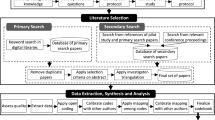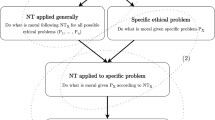Abstract
In this paper, a critique will be developed and an alternative proposed to Luciano Floridi’s approach to Information Ethics (IE). IE is a macroethical theory that is to both serve as a foundation for computer ethics and to guide our overall moral attitude towards the world. The central claims of IE are that everything that exists can be described as an information object, and that all information objects, qua information objects, have intrinsic value and are therefore deserving of moral respect. In my critique of IE, I will argue that Floridi has presented no convincing arguments that everything that exists has some minimal amount of intrinsic value. I will argue, however, that his theory could be salvaged in large part if it were modified from a value-based into a respect-based theory, according to which many (but not all) inanimate things in the world deserve moral respect, not because of intrinsic value, but because of their (potential) extrinsic, instrumental or emotional value for persons.
Similar content being viewed by others
References
J.B. Callicott. Intrinsic Value in Nature: A Metaethical Analysis. Electronic Journal of Analytic Philosophy, 3(Spring), 1995.
L. Floridi. Information Ethics: On the Theoretical Foundations of Computer Ethics. Ethics and Information Technology, 1(1): 37–56, 1999.
L. Floridi. Information Ethics: An Environmental Approach to the Digital Divide. Philosophy in the Contemporary World, 9(1): 39–45, 2002.
L. Floridi. On the Intrinsic Value of Information Objects and the Infosphere. Ethics and Information Technology, 4(4): 287–304, 2003.
L. Floridi. Informational Realism. In J. Weckert and Y. Al-Saggaf, editors, Computers and Philosophy 2003— Selected Papers from the Computers and Philosophy conference (CAP 2003), vol. 37, pp. 7–12. Conferences in Research and Practice in Information Technology, ACS, 2004.
L. Floridi. Is Semantic Information Meaningful Data? Philosophy and Phenomenological Research, 70(2): 351–370, 2005.
L. Floridi. Semantic Conceptions of Information. In J. Zalta, editor, Stanford Encyclopedia of Philosophy, 2005b (Online at http://plato.stanford.edu/).
L. Floridi. Global Information Ethics: The Importance of Being Environmentally Earnest. International Journal of Technology and Human Interaction, 3(3): 1–11, 2007a.
L. Floridi. Information Ethics: Its Nature and Scope. In Jeroen van den Hoven and John Weckert, editors, Moral Philosophy and Information Technology, pp. 40–65. Cambridge University Press, Cambridge, 2007b.
L. Floridi. A Defence of Informational Structural Realism. Synthese, 161(2): 219–253, 2008.
L. Floridi and J. W. Sanders. Artificial Evil and the Foundation of Computer Ethics. Ethics and Information Technology, 3(1): 55–66, 2001.
L. Floridi and J. W. Sanders. Computer Ethics: Mapping the Foundationalist Debate. Ethics and Information Technology, 4(1): 1–9, 2002.
B. Meyer. Object-Oriented Software Construction, 2nd ed. Prentice Hall, Englewood Cliffs, NJ, 1997.
Author information
Authors and Affiliations
Corresponding author
Rights and permissions
About this article
Cite this article
Brey, P. Do we have moral duties towards information objects?. Ethics Inf Technol 10, 109–114 (2008). https://doi.org/10.1007/s10676-008-9170-x
Received:
Accepted:
Published:
Issue Date:
DOI: https://doi.org/10.1007/s10676-008-9170-x




